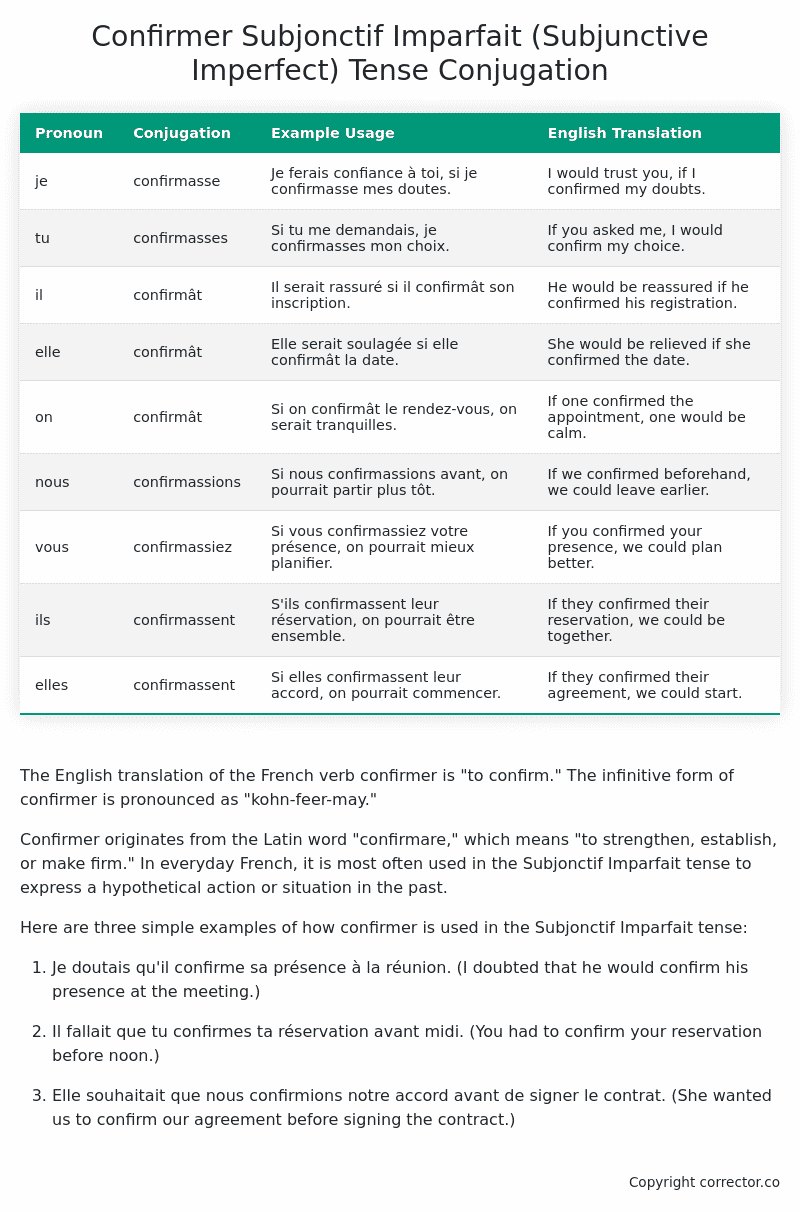Subjonctif Imparfait (Subjunctive Imperfect) Tense Conjugation of the French Verb confirmer
Introduction to the verb confirmer
The English translation of the French verb confirmer is “to confirm.” The infinitive form of confirmer is pronounced as “kohn-feer-may.”
Confirmer originates from the Latin word “confirmare,” which means “to strengthen, establish, or make firm.” In everyday French, it is most often used in the Subjonctif Imparfait tense to express a hypothetical action or situation in the past.
Here are three simple examples of how confirmer is used in the Subjonctif Imparfait tense:
-
Je doutais qu’il confirme sa présence à la réunion. (I doubted that he would confirm his presence at the meeting.)
-
Il fallait que tu confirmes ta réservation avant midi. (You had to confirm your reservation before noon.)
-
Elle souhaitait que nous confirmions notre accord avant de signer le contrat. (She wanted us to confirm our agreement before signing the contract.)
Table of the Subjonctif Imparfait (Subjunctive Imperfect) Tense Conjugation of confirmer
| Pronoun | Conjugation | Example Usage | English Translation |
|---|---|---|---|
| je | confirmasse | Je ferais confiance à toi, si je confirmasse mes doutes. | I would trust you, if I confirmed my doubts. |
| tu | confirmasses | Si tu me demandais, je confirmasses mon choix. | If you asked me, I would confirm my choice. |
| il | confirmât | Il serait rassuré si il confirmât son inscription. | He would be reassured if he confirmed his registration. |
| elle | confirmât | Elle serait soulagée si elle confirmât la date. | She would be relieved if she confirmed the date. |
| on | confirmât | Si on confirmât le rendez-vous, on serait tranquilles. | If one confirmed the appointment, one would be calm. |
| nous | confirmassions | Si nous confirmassions avant, on pourrait partir plus tôt. | If we confirmed beforehand, we could leave earlier. |
| vous | confirmassiez | Si vous confirmassiez votre présence, on pourrait mieux planifier. | If you confirmed your presence, we could plan better. |
| ils | confirmassent | S’ils confirmassent leur réservation, on pourrait être ensemble. | If they confirmed their reservation, we could be together. |
| elles | confirmassent | Si elles confirmassent leur accord, on pourrait commencer. | If they confirmed their agreement, we could start. |
Other Conjugations for Confirmer.
Le Present (Present Tense) Conjugation of the French Verb confirmer
Imparfait (Imperfect) Tense Conjugation of the French Verb confirmer
Passé Simple (Simple Past) Tense Conjugation of the French Verb confirmer
Passé Composé (Present Perfect) Tense Conjugation of the French Verb confirmer
Futur Simple (Simple Future) Tense Conjugation of the French Verb confirmer
Futur Proche (Near Future) Tense Conjugation of the French Verb confirmer
Plus-que-parfait (Pluperfect) Tense Conjugation of the French Verb confirmer
Passé Antérieur (Past Anterior) Tense Conjugation of the French Verb confirmer
Futur Antérieur (Future Anterior) Tense Conjugation of the French Verb confirmer
Subjonctif Présent (Subjunctive Present) Tense Conjugation of the French Verb confirmer
Subjonctif Passé (Subjunctive Past) Tense Conjugation of the French Verb confirmer
Subjonctif Imparfait (Subjunctive Imperfect) Tense Conjugation of the French Verb confirmer (this article)
Subjonctif Plus-que-parfait (Subjunctive Pluperfect) Tense Conjugation of the French Verb confirmer
Conditionnel Présent (Conditional Present) Tense Conjugation of the French Verb confirmer
Conditionnel Passé (Conditional Past) Tense Conjugation of the French Verb confirmer
L’impératif Présent (Imperative Present) Tense Conjugation of the French Verb confirmer
L’infinitif Présent (Infinitive Present) Tense Conjugation of the French Verb confirmer
Struggling with French verbs or the language in general? Why not use our free French Grammar Checker – no registration required!
Get a FREE Download Study Sheet of this Conjugation 🔥
Simply right click the image below, click “save image” and get your free reference for the confirmer Subjonctif Imparfait tense conjugation!

Confirmer – About the French Subjonctif Imparfait (Subjunctive Imperfect) Tense
Formation
Common Everyday Usage Patterns
Interactions with Other Tenses
Subjonctif Présent
Indicatif Passé Composé
Conditional
Conditional Perfect
Summary
I hope you enjoyed this article on the verb confirmer. Still in a learning mood? Check out another TOTALLY random French verb conjugation!


